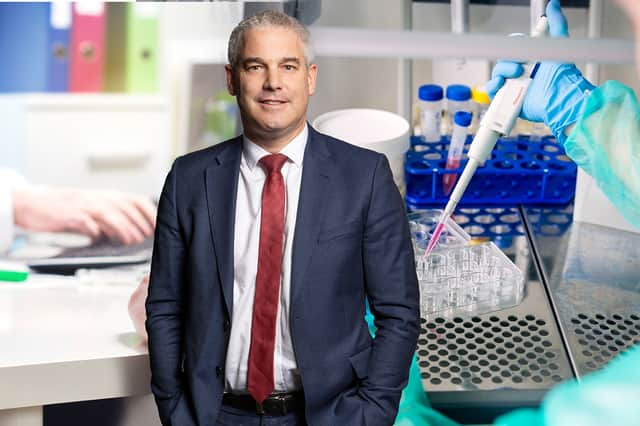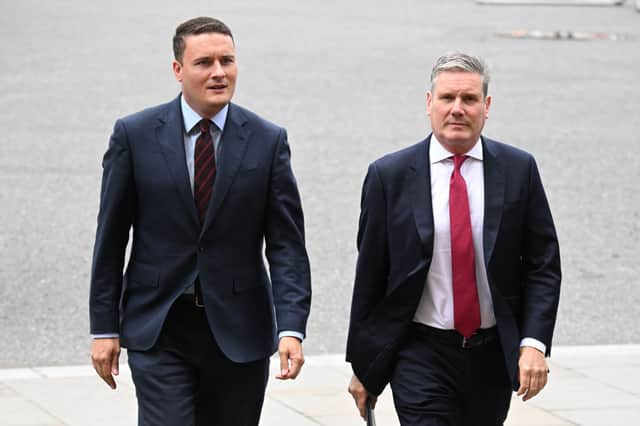NHS cancer waiting times: government considering scrapping 2-week referral target - what is current situation?
This article contains affiliate links. We may earn a small commission on items purchased through this article, but that does not affect our editorial judgement.
and live on Freeview channel 276
Targets that ensure patients see a cancer specialist within two weeks of being urgently referred by their GP in England could be scrapped, it has been revealed.
The new plans, known as the Faster Diagnosis Standard, propose that patients who have been urgently referred should have cancer ruled out or receive a diagnosis within 28 days. According to the BBC, the outcome of a consultation is set to be announced in the coming days, although this would be subject to a final sign-off by Health Secretary Steve Barclay.
Advertisement
Hide AdAdvertisement
Hide AdHowever a leading cancer charity has called the news "ominous and deeply worrying". It comes after new data revealed cancer wait times in England remain well below targets set by the government and NHS.
What are the current cancer waiting times targets?
There are currently nine targets which the government uses to judge how well the NHS in England is tackling cancer. These include that patients with suspected cancer should see a specialist within two weeks of being urgently referred by a GP, and that they should start their treatment within two months of that referral.
These targets are currently routinely missed. The latest figures, which were released last week and cover June, show that the number of patients who saw a specialist within two weeks of being referred fell slightly from 80.8% in May to 80.5% in June. The target is 93%, which was last hit in May 2020.
A total of 59.2% of patients had their first treatment less than two months after their GP referral, up slightly from 58.7% in May but below the target of 85%. And, 73.5% of patients urgently referred for suspected cancer were diagnosed or had cancer ruled out within 28 days, up from 71.3% the previous month. The NHS' target is to hit 75% by March 2024.
Advertisement
Hide AdAdvertisement
Hide AdLast week, Minesh Patel, head of policy at Macmillan Cancer Support, said the numbers “yet again reflect the UK government’s bleak record of tackling the cancer care crisis in England”. He added: “Despite the best efforts of hardworking NHS professionals, thousands of people are being left in limbo as waits for vital cancer tests and treatment remain unacceptably high.”


What is the Faster Diagnosis Standard?
The government reportedly wants to reduce the number of targets from nine to three, in a plan known as the Faster Diagnosis Standard, which they say is backed by leading cancer experts (although one charity has criticised the move). Health Secretary Steve Barclay said this was being led by cancer specialists in the NHS and "not imposed by the government".
The BBC says the three targets which would be kept are:
- Diagnosis of cancer within 28 days of referral.
- Starting treatment within two months of an urgent referral.
- Starting treatment one month after a decision to treat.
Patients who have been urgently referred, have symptoms of breast cancer, or have been picked up through screening, should have cancer ruled out or receive a diagnosis within 28 days.
Those with cancer should receive their first treatment within a month of a decision to treat after diagnosis – known as the 31-day decision to treatment standard – while those who have been diagnosed will start treatment within nine weeks from the date of referral, known as the 62-day referral to treatment standard.
Advertisement
Hide AdAdvertisement
Hide AdAn NHS England spokesperson explained: "By making sure more patients are diagnosed and treated as early as possible following a referral and replacing the outdated two-week wait target with the faster diagnosis standard already being used across the country, hundreds of patients waiting to have cancer ruled out or diagnosed could receive this news faster."


What have cancer charities said?
Oncologist Professor Pat Price, who is co-founder of the #CatchUpWithCancer campaign, branded news of the potential new targets “ominous and deeply worrying”. She said: “The performance against the current targets is shockingly bad and has been for many, many months now, deteriorating over years.
“While we agree chasing too many targets can be disruptive and divert resources away from the main patient 62-day treatment target, poor performance is not as a result of how we are measuring it. The clear and simple truth is that we are not investing enough in cancer treatment capacity and getting the whole cancer pathway working.”
She added: “Without a radical new cancer plan we will just be making some modest headway in identifying cancer patients quicker, but then adding those newly diagnosed patients to a long and potentially lethal waiting list for treatment. This is a road to continuing poor outcomes including unnecessary deaths.”
Advertisement
Hide AdAdvertisement
Hide AdHowever Patel, from Macmillan Cancer Support, was more positive, saying: “Focusing more on ensuring people with cancer receive a diagnosis as quickly as possible should help improve patient outcomes. However, this and any other cancer targets will only be met if the UK government deals with the systemic challenges in cancer care in England.
“Cancer care is in crisis and performance against waiting times targets have been unacceptably low for years. Ultimately, we need to see people getting tested, diagnosed and treated faster. The UK government must step in and provide cancer services with the funding and staff needed to provide timely and quality care to all cancer patients. Without this, the new targets will fall flat before they’ve even started.”
What has the government said?
Health Secretary Steve Barclay was on the morning media round - as part of the government's "health week" - however he would not be drawn into the claims that two-thirds of the cancer targets will be scrapped.
He told BBC Breakfast: “What we have is a consultation at the moment with leading clinical figures in the cancer world and with the cancer charities asking whether the checks we have got are driving the right outcomes in terms of cancer survival or whether there are better ways of measuring those.
Advertisement
Hide AdAdvertisement
Hide Ad"The story relates to a leak, and ministers don’t comment on leaks. It is not something being imposed by the Government, it is in response to requests by those working in the cancer field and any changes, if they are announced in the coming days, will be in consultation with the leading cancer charities.”
What has Labour said?
Labour leader Sir Keir Starmer accused the Government of “moving the goalposts”. He said: " “I want swifter diagnosis, of course I do – both for the individuals concerned and obviously for the health service.
“The way to do that is to have a health service that’s fit for the future. We haven’t got one. I’ve set out a plan for that which involves people, technology and reform.
“With this government, it’s targets that they’ve repeatedly failed to hit. And now what they’re doing is moving the goalposts and even where they’re keeping targets after this streamlining, there’s targets they’re still not hitting.”
While Shadow Health Secretary Wes Streeting told the Sunday Times: "Sunak should focus on cutting waiting times, not cutting standards for patients."
Comment Guidelines
National World encourages reader discussion on our stories. User feedback, insights and back-and-forth exchanges add a rich layer of context to reporting. Please review our Community Guidelines before commenting.
